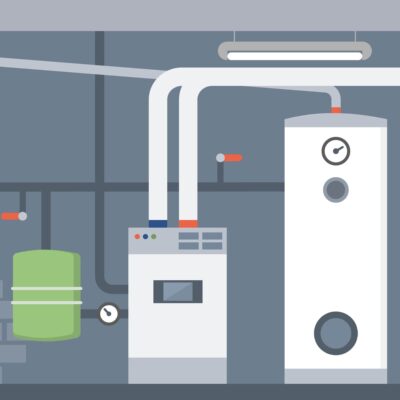Blog
Heating Systems 101: Furnace, Boiler or Heat Pump?

Furnace: The Forced-Air Option
A furnace is a popular choice across the U.S., particularly in colder regions like ours. It heats air and uses a blower motor to distribute the warmed air through a series of ductwork throughout your home. Furnaces can run on electricity, propane, or natural gas. Natural gas furnaces, in particular, can efficiently heat your home even when outdoor temperatures are extremely low.
Boiler: Harnessing the Power of Water
Boilers, on the other hand, heat water which is then circulated through radiators or under-floor radiant heat systems. This method of heating can provide a quieter, less drying form of warmth compared to furnaces.
Heat Pump: Heating and Cooling in One
Heat pumps have come a long ways and are a more viable choice in cold climates like ours. Unlike furnaces and boilers, heat pumps can both heat and cool your home. They transfer heat from the air (or ground) outside to the air inside during winter and reverse the process in the summer. They are particularly energy-efficient in moderate climates, but do need a backup for colder weather.
When deciding between these heating systems, consider the following factors:
1) Installation
Each heating system comes with its challenges. Furnaces require a venting system, whereas heat pumps need an outside unit. Boilers, which also need venting, can be more complicated to install due to the piping required.
2) Operating Cost
Furnaces, specifically gas ones, can be cheaper to operate but only if you have access to natural gas. Electric furnaces and heat pumps can come with higher electric bills, though advancements in heat pump technology have led to considerable improvements in efficiency.
3) Longevity and Maintenance
Heat pumps typically have a shorter lifespan than furnaces or boilers. They function year-round, which can result in faster wear. All systems, however, benefit significantly from regular maintenance.
4) Comfort
While all systems provide warmth, some homeowners prefer the moisture-preserving radiant heat provided by boilers, while others favor the quick heating action of a furnace.
Our team at Indoor Air Quality, Inc., backed by 60 years of combined experience and a commitment to ongoing education, can provide guidance tailored to your specific needs, home characteristics, and personal preferences. We proudly serve Highlands Ranch, Castle Pines, Littleton, Ken Caryl, Englewood, Centennial, and the wider Denver Metro area with prompt and clean service.
Whether you ultimately choose a furnace, a boiler, or a heat pump, our commitment is to make your home as comfortable, safe, and energy-efficient as possible. Contact our experienced and certified technicians today to learn more about your heating options. Ensure your home is well-equipped for the Denver winter with Indoor Air Quality, Inc. Your home comfort is our top priority.




